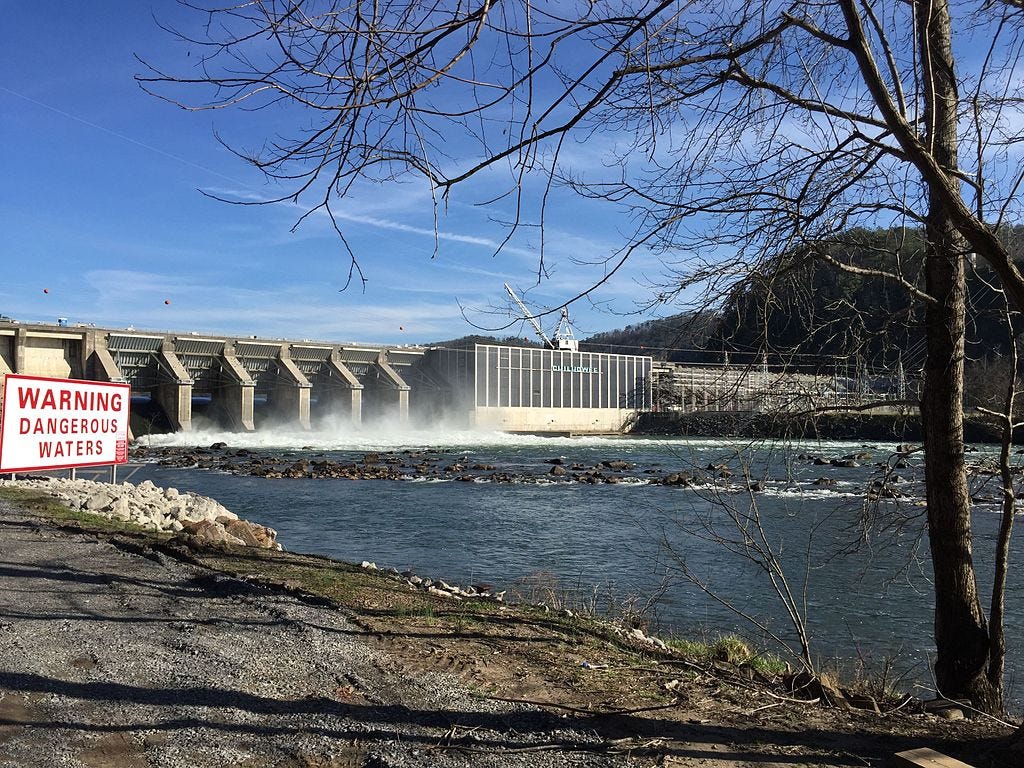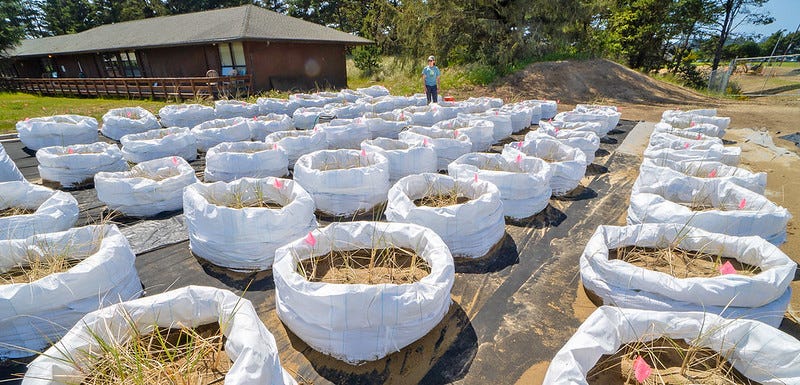The ESG election; plus scaling climate transition with Salesforce's Patrick Flynn
Welcome to Callaway Climate Insights, and especially to our new subscribers. If you are in the U.S., be sure to vote. And if this was forwarded to you, be sure to sign up.

White House fall garden tours, Oct. 18, 2020. Photo: White House.
I voted yesterday! Never seen so many people standing around a ballot box talking through their masks about how excited they were to vote. It was like a cocktail party for Democracy, without the cocktails.
The homestretch to Nov. 3 begins later this week with the final Trump-Biden debate on Thursday and it’s expected to have a climate change section in it, according to NBC News, which is hosting the debate in Nashville, Tenn. My latest ZEUS column discusses how the issue has been dumbed-down so far by arguments about fracking. We’ll get more of that Thursday, no doubt, but maybe also a bit more on what’s at stake should either candidate win.
Voice of America had a piece saying Trump’s environmental rules rollbacks to date, if left untouched, will raise U.S. emissions by 3% by 2035, vs. a radical decline that’s needed to meet the Paris Agreement standards. Of course, if Trump wins we won’t be in the Paris Agreement. So there’s that.
Essentially, this is Biden’s last chance to win over young Republicans and any undecideds who might put climate change higher on their list of priorities than the Trump base does. He needs to get beyond the fracking jobs stuff and really lay out his case to transition the U.S. economy. No less authority on climate change than the BBC says the potential for the world to adapt to climate change depends on the outcome of this U.S. election. Thanks for the added pressure, Beebs.
If I’m Trump, I’m looking to do a stimulus deal this week that jerks the market higher ahead of the election and takes out the Covid anger, a little. But then again, if I’m looking to the market as my guide, when it comes to vital issues such as climate change and the pandemic, I might notice that it’s essentially already voted.
More insights below. . . .
And don’t forget to contact me directly if you have suggestions or ideas at dcallaway@callawayclimateinsights.com.
Sustainability Stars: Salesforce’s Patrick Flynn

. . . . Bigger than digital: For Patrick Flynn, vice president of sustainability at Salesforce (above), the climate problem is all about scale. Because it is a global problem, only a global response — from all businesses and all governments — will help solve it, Flynn tells Marsha Vande Berg in an exclusive interview for Callaway Climate Insights. Salesforce itself has ambitious targets to be entirely on renewable energy within two years. But he realizes many clients have big challenges, too. Flynn tells us how Salesforce is working with its customers to help, and why he thinks the decarbonization of the world will be a bigger transition than the move to the Internet.
Q: Can you explain sustainability’s value proposition for companies worldwide?
A: Climate change is going to cause the decarbonization of every industry — transportation, energy, agriculture, manufacturing, construction, and on and on. Investors and insurers will have to evolve how they assess opportunities and risks. This decarbonization transition will be bigger, faster and more universal than the digital transition. For those companies that take action, the benefits show up in all aspects of the business: the ability to attract and retain top talent, building customer relationships based on shared values, reducing operational costs, mitigating long term risk and identifying long-term opportunity. . . .

Above, the Chilhowee hydroelectric dam in Tennessee, built by Alcoa in 1957. Photo: Shikhin21/Wikipedia.
. . . . To ESG or not to ESG: The Department of Labor submitted the final wording of its ESG fiduciary rule to the Office of Management and Budget last week, after a consultation period that saw almost 8,000 mostly-negative responses to the plan to limit how fiduciaries can use environmental, social and governance funds. The OMB has 90 days, but most in the industry think it could rule on the idea in a few weeks. Meanwhile, in Europe, PWC issued a report this week that said almost 60% of European funds will be ESG by 2025, and that more than three-quarters of institutional investors will stop buying non-ESG securities (See fossil fuels) within the next two years. PWC said the transition is the biggest thing to happen to asset management since the creation of exchange-traded funds two decades ago, and that it expects the compound annual growth rate to be upwards of 26.8% by 2025. And the U.S. is going to limit the use of these funds because why? . . .
. . . . Fracking toward Bethlehem: Some reports said ConocoPhillips (COP) doubled-down on fracking. Some said it’s the consolidation of the shale industry amid oil’s collapse. Whatever spin you want to put on the company’s $9.7 billion of Concho Resources Monday, there’s no doubting we are entering a period of less and less fossil fuel companies. More than 50 have filed for bankruptcy already this year. More are looking to acquisitions to boost value for their shareholders, including Concho, and Noble Energy (NBL) this past summer in its deal to be bought by Chevron (CVX). Forget divestment. Deal-making is leading this late cycle. . . .
. . . . Question time: As earnings season progresses, expect more and more company calls with investors and analysts to contain questions about decarbonization and ESG practices. It’s not just the annual meetings where investors are making themselves heard. Aluminum maker Alcoa Corp. (AA) found that out this week when its call was filled with questions about how fast it is moving to reduce its carbon footprint. As investors take ESG statistics more and more into account in their decision making, the speed at which companies are moving will become a bigger focus. The trend also illustrates how investors are demanding big polluters transition to low-carbon strategies, rather than just divest their stocks. . . .
. . . . SDCL Energy Efficiency Income Trust Plc, the only British public entity to operate exclusively in the climate-fighting realm, announced it will pay £100 million ($129 million) to buy Vartan Gas Stockholm AB, the gas distribution network for the Swedish capital. Jonathan Maxwell, founder of the trust’s parent, Sustainable Development Capital, raised money earlier this year for acquisitions. He said in a statement this investment in the operator of Stockholm’s gas grid, which uses biomass to reduce emissions, will be an attractive income-generator and will help the trust maintain its strong dividend. . . .
. . . . From the headlines:
Great piece by Peter McCillop at Climate & Capital Media on a new study by the Ceres Accelerator that the number of syndicated loans at banks facing climate risk could be as high as 70%, more than seven times previously thought.
A British investor group is suing to make climate reporting mandatory for the 500 largest public firms in the UK.
Societe General has appointed Yasmine Djeddaias head of sustainable finance in Asia, based in Hong Kong.
Data driven: It’s World Statistics Day, so make it count
News briefs: Fukushima's nuclear water, FERC's carbon-pricing idea
Watch this: From the International Monetary Fund — Without immediate emission reduction policies, global warming will soon have catastrophic implications. An initial green investment push together with gradually rising carbon prices would reduce emissions sufficiently at reasonable output costs. Watch the video.
Editor’s picks:
Japan plans to release Fukushima’s contaminated water in the sea
FERC gets rapped over carbon pricing plan
Offshore renewables key to energy transformation, investment
Latest findings: New research, studies and projects

Rebecca Mostow, a doctoral candidate in the College of Science at Oregon State University, stands among beach grass growing in bags of sand at the Hatfield Marine Science Center in Newport. She is studying a hybrid beach grass that originates from two species that are not native to the Pacific Northwest. Oregon Sea Grant is funding the research. Photo: Mark Farley.
How climate change, Covid-19, disasters and more hurt productivity
In the paper Implications of Major Adverse Events on Productivity, the authors write: Since 2000, there have been three major global slowdowns, with the latest and most pronounced episode triggered by the Covid-19 pandemic. At the same time, many countries have faced major adverse events including natural disasters, wars, and financial crises, all of which can lead to long-lasting harm to productivity. … The greater frequency of natural disasters, especially climate disasters, means that they have the largest aggregate impact on productivity, as natural disasters have occurred most often and their frequency has doubled since 2000. Global adverse events can have large sustained negative effects on productivity through dislocating labor, tightening of credit, disrupting value chains, and decreasing innovation. Policies to counter the negative consequences of adverse shocks include accommodative fiscal policies, such as reconstruction spending on resilient infrastructure; transparent governance; efficient use of relief funds; as well as growth-friendly structural reforms. Appropriate policies and regulations concerning finance, construction, and environmental protection can help reduce the frequency of adverse shocks. Authors: Alistair Dieppe, European Central Bank; Sinem Kilic Celik, World Bank; Cedric Iltis Finafa Okou, World Bank
More research:
Indigenous educators are bringing western and native science together in the classroom: By meshing laboratory science with Traditional Ecological Knowledge, college professors aim to cultivate better environmental decision makers, and decisions.
Modeling the cascading infrastructure impacts of climate change: New research highlights how interdependences among infrastructure systems like roads can complicate climate adaptation.



